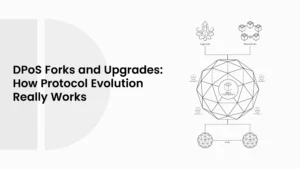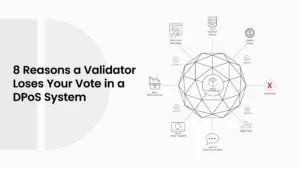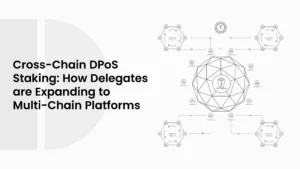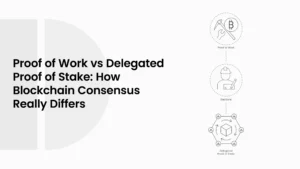How DPoS Offers Secure and Scalable Governance in the Future of Smart Cities
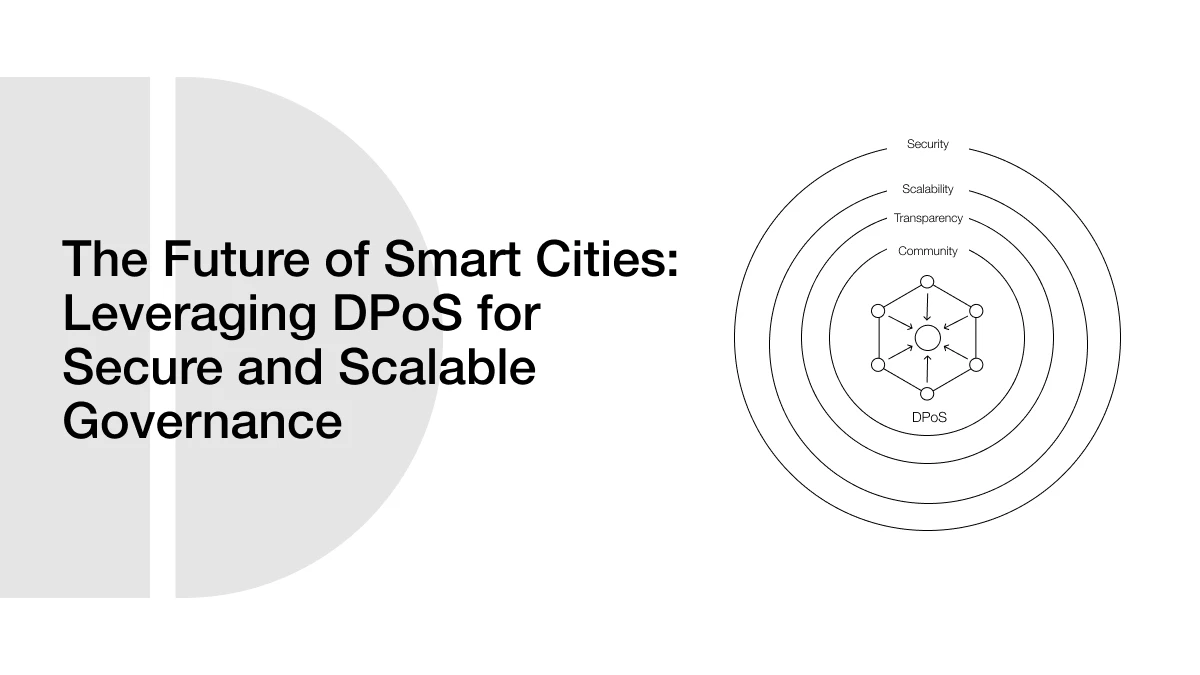
Cities around the world are undergoing rapid change. Technology is becoming an integral part of every service people use in their daily lives. From the buses people ride to the way our trash is collected, data is now used to make cities run better. These modern cities, often called smart cities, use sensors, apps, and connected systems to keep services smooth and efficient.
- What is DPoS and Why Does It Matter for Smart Cities?
- Basic Working of DPoS
- Difference Between DPoS and Other Consensus Models
- Why Efficiency Matters in Urban Governance
- Smart City Infrastructure: The Governance Challenge
- IoT as the Backbone of Smart Cities
- Governance Issues in Smart Cities
- Common Smart City Challenges and Their Impact on Citizens
- How DPoS Could Transform Smart City Governance
- Transparency and Open Data in City Management
- Decentralized Citizen Participation
- Automation and Faster Decision-Making
- Traditional Governance vs DPoS Governance in Smart Cities
- Applications of DPoS in Smart City Services
- Waste Management
- Transportation Systems
- Energy Distribution
- Smart City Services and Potential DPoS Use Cases
- Applications of Edge AI in DPoS Networks
- Real-Time Delegate Selection
- Continuous Performance Monitoring
- Smarter Voting and Governance
- Fraud Detection and Security
- Benefits of Real-Time Optimization in DPoS
- Faster Block Validation
- Reduced Network Latency
- Higher Security and Fraud Prevention
- Fairer Governance and Voting
- Cost Efficiency
- Case Studies and Examples of Edge AI in DPoS
- UAV-Assisted DPoS Networks
- IoT and Smart City Applications
- AI for Governance Optimization
- Gaming and Financial Applications
- Challenges and Limitations of Using Edge AI in DPoS
- Hardware and Infrastructure Costs
- Data Privacy and Security Risks
- Model Accuracy and Bias
- Conclusion
- Frequently Asked Questions About the Future of Smart Cities
- What is Edge AI in DPoS?
- How does Edge AI improve delegate performance?
- What are the main benefits of Edge AI in DPoS?
- Are there risks in using Edge AI in DPoS networks?
- Is Edge AI the future of DPoS?
- Glossary of Key Terms
But there is a big challenge. Who controls all this data, and how are the decisions made? If one company or one government office has too much control, users may not feel safe or fairly treated. Trust becomes weak when people think their voices do not matter. In fact, many researchers believe that without proper governance, smart cities can create more inequality instead of solving it (Venumuddala, Prakash, & Chaudhuri, 2024).
This is where blockchain technology comes in. Blockchain is an accountable technology used to keep data in a secure and transparent form. There is a specific approach, known as Delegated Proof of Stake, or DPoS. Through this process, individuals can elect delegates who make decisions on their behalf. It is quicker, more democratic, and energy-efficient as opposed to older blockchain techniques.
Simply, DPoS allows users an avenue to participate in the governance of their city. Users don’t need to wait for city officials to make every decision; they can express their opinion with the help of a fair voting system. As an illustration, they may be asked to vote on how waste is handled or how fees for public transport are determined. The system would be transparent, impenetrable, and difficult to rig.
What is DPoS and Why Does It Matter for Smart Cities?
Smart cities depend on systems that can handle large amounts of data quickly. They need tools that allow citizens to trust decisions, while also ensuring fairness. One of the best technologies that can support this is Delegated Proof of Stake (DPoS). To understand why, let’s first look at what it is and how it works.
ALSO READ: DPoS in 6G Networks: The Future of Blockchain and Hyperconnected Economies
Basic Working of DPoS
Delegated Proof of Stake (DPoS) is a blockchain system. In this system, the network of people votes on a small number of representatives known as delegates. Such delegates take care of transaction verification, updating the blockchain, and ensuring the smooth operation of the system.
Consider it a city election. Rather than every individual making every decision, individuals elect trusted leaders. Such leaders are then allowed to make decisions on behalf of the community. It is transparent, as everybody can see who made which decisions, and who the delegate is. It is also flexible, because if a delegate fails to act reasonably, people can vote them out and pick someone else.
This model makes DPoS faster than older blockchain systems like Proof of Work. It uses less energy and can handle many more transactions per second, which is important for busy city networks (Allhoff & Henschke, 2018).
Difference Between DPoS and Other Consensus Models
Other conventional blockchains operate through a Proof of Work (PoW) or Proof of Stake (PoS). PoW involves computers racing to solve puzzles to verify transactions. This is a slow process and consumes much energy. In PoS, individuals with larger amounts of coins have higher opportunities to validate transactions, and this can result in a disadvantaged position for the poor.
DPoS is different. It enables everybody to participate through the voting of delegates. Although a person may lack many resources, they have a voice. This renders it more democratic and community-based. In the case of a smart city, this means that more citizens will be able to shape decisions rather than leaving power to a small number of people.
For example, in a city using PoW-based governance, it would take a long time to process data from thousands of sensors in buses, water systems, or waste management. With DPoS, the decisions could be validated almost instantly.
Why Efficiency Matters in Urban Governance
Cities are very dynamic. Traffic patterns change every minute. Energy demand can rise suddenly during heat waves. Waste collection routes need adjustments based on daily needs. For all of this to work well, governance must be quick, fair, and reliable.
This is where DPoS shows its strength. Since it can process thousands of actions per second, it fits perfectly into smart city systems. Delegates can approve changes fast, ensuring that services like public transportation or electricity distribution are not delayed. Citizens can also trust the system more because they know their delegates are accountable to them.
In short, DPoS provides the speed and transparency that modern cities require. It creates a balance between technology and citizen control, which is exactly what a smart city needs to grow responsibly.
ALSO READ: How Edge AI Optimizes Delegate Performance in Real-Time for Faster DPoS Blockchain
Smart City Infrastructure: The Governance Challenge
Smart cities are built on a mix of technology, people, and services. These systems are not simple. They work like living organisms, where many parts connect and react to each other. In research, such systems are often called Complex Adaptive Systems (CAS). A CAS can adapt, organize itself, and survive even if some parts fail (Batty, 2009).
In smart cities, CAS can be seen in action every day. Traffic moves in patterns without anyone controlling each car. Energy use rises and falls based on weather and human behavior. Waste piles up differently in each neighborhood. These changes happen naturally, but they also make city management very hard.
IoT as the Backbone of Smart Cities
The primary smart city infrastructure driver is the Internet of Things (IoT). Data is gathered on buses, the electric grid, water pipes, and garbage trucks through sensors. This information drains down to systems that assist in decision-making in the city. That is, IoT may indicate which street is overcrowded or which district has a ruptured water pipe.
While IoT improves efficiency, it also creates risks. If data is controlled by only one company or office, the system may become unfair. Citizens may not know how decisions are made. Privacy may also be at risk, since IoT devices track personal habits like travel routes or energy use.
Governance Issues in Smart Cities
Governance is about how power is used to manage resources and make decisions. In smart cities, governance faces some big challenges:
- Trust: Citizens need to trust that their data is safe and used fairly.
- Fairness: Services must reach everyone, not just the rich or tech-savvy.
- Accountability: If something goes wrong, people must know who is responsible.
- Digital Divide: Not everyone has equal access to smartphones or the internet, so many risk being left behind.
Without solving these problems, smart city projects may create more inequality instead of building inclusive, sustainable communities.
Common Smart City Challenges and Their Impact on Citizens
| Challenge | Description | Impact on Citizens |
| Trust | Who controls and uses the data collected by IoT | Fear of misuse, loss of confidence |
| Fairness | Unequal service distribution | Rich areas may get better services |
| Accountability | Hard to identify responsibility in complex systems | Citizens can’t demand justice when wronged |
| Digital Divide | Not all people can access apps or devices | Excludes low-income and rural populations |
In short, smart city infrastructure is powerful but also fragile. The systems are fast, adaptive, and data-driven, yet they risk being unfair if governance is not done right. This is why a new model like DPoS could bring balance by making decisions transparent and involving citizens directly.
How DPoS Could Transform Smart City Governance
Efficient governance systems are needed in smart cities. Conventional forms of governance tend to be slow, closed, and not transparent. Delegated Proof of Stake (DPoS) can be a game-changer as it introduces fairness, speed, and accountability to the management of cities. How? Let us see how.
Transparency and Open Data in City Management
Transparency is one of the greatest advantages of DPoS. All the actions that the delegates perform are logged in the blockchain. This implies that citizens can monitor the decision-making process and who has authorized such decisions.
A large number of decisions in a standard city system occur behind closed doors. People are often unaware of the reasons why the buses were assigned specific routes or why the taxes on waste kept rising. Records in DPoS are public, which means that leaders have little chance to conceal errors or biased operations.
This transparency ensures trust, which is the key to good governance.
ALSO READ: Can Hybrid Consensus Models Outperform Pure DPoS: A Real-Life Study
Decentralized Citizen Participation
DPoS provides citizens with direct participation in the decisions of the city. Citizens can vote frequently on the administration of particular services in the town rather than voting once every few years in political elections.
As an example, when it is desired that more money is invested in solar energy or that recycling programs are improved, one can vote for delegates who will advocate such policies. In case such delegates fail to deliver, there is a possibility of having other replacements.
This creates a dynamic and democratic model where power truly belongs to the people.
Automation and Faster Decision-Making
In cities, thousands of decisions are necessary on a daily basis. Traffic lights should switch with the flow. Energy grids have to be balanced. The routes used by waste trucks should be modified on the fly.
Conventional governance is usually not able to match such a pace. DPoS is useful as it allows for fast decision processing. Verification of actions by the delegates is virtually immediate, and thus, real-time automation is a possibility.
For example, a DPoS system could allow a city to adjust congestion charges immediately when traffic becomes heavy, instead of waiting weeks for policy approval.
Traditional Governance vs DPoS Governance in Smart Cities
| Feature | Traditional Governance | DPoS Governance |
| Decision-Making Speed | Slow, bureaucratic | Fast, near real-time |
| Citizen Participation | Limited to elections every few years | Ongoing, with frequent delegate voting |
| Transparency | Low, decisions often hidden | High, every action recorded on blockchain |
| Accountability | Hard to track responsibility | Easy to identify delegates and their actions |
| Efficiency | Struggles with large data and real-time needs | Handles thousands of transactions per second |
DPoS changes the way power works in smart cities. Instead of only a few officials or companies making choices, citizens gain a real voice. The system becomes faster, fairer, and more open. This is why many experts believe that DPoS is a good fit for the future of smart city governance (Singh et al., 2018).
Applications of DPoS in Smart City Services
The power of Delegated Proof of Stake (DPoS) becomes clear when everyone looks at how it can be used in real city services. Waste collection, public transport, and energy systems are three main areas where DPoS can bring big improvements.
Waste Management
Waste collection is one of the hardest tasks in big cities. Trucks must follow routes, households need regular pick-up, and recycling goals must be met.
With DPoS, citizens can have a say in how this system works. For example, they could vote for delegates who support recycling rewards. Households that recycle more could get tokens, which can be used to pay part of their utility bills.
Delegates would also make sure waste data is transparent. Citizens could check if trucks really followed routes, if waste plants are meeting goals, and if funds for waste management are being spent fairly. This builds trust and reduces corruption.
Transportation Systems
Traffic is a major problem in almost every city. Smart cities already use sensors to track vehicles and adjust traffic lights. But governance of transport systems often remains centralized and slow.
DPoS can change this by allowing citizens to vote for transport policies in real-time. For example, a delegate system could decide on congestion charges. If traffic in one area becomes too heavy, delegates could approve instant adjustments in fees.
It could also be used for bus scheduling. Instead of waiting months for city councils to study transport data, delegates could use blockchain votes to change routes quickly. This saves time and improves service for everyone.
Energy Distribution
Energy demand changes constantly. On hot days, air conditioning use may rise sharply. At night, demand drops. Traditional power grids often struggle to manage this balance.
With DPoS, delegates can help run smart grids. Local energy policies, such as increased investment in renewable power, could also be voted on by users. Peer-to-peer energy sharing, with homes with solar panels selling excess energy to neighbors, might be supported by a blockchain system.
Because the process is recorded on blockchain, both suppliers and consumers trust that prices and usage data are fair. This prevents big companies from taking too much control and ensures equal access.
Smart City Services and Potential DPoS Use Cases
| Smart City Service | Current Challenge | DPoS Solution Example |
| Waste Management | Corruption, poor recycling participation | Token rewards for recycling, delegate oversight |
| Transportation | Slow policy changes, congestion | Delegate voting on dynamic fees and bus routes |
| Energy Distribution | Balancing demand, unfair pricing | Peer-to-peer energy trading, fair pricing rules |
DPoS gives each of these services a new level of fairness and transparency. It allows citizens to have a real voice, ensures faster responses, and builds systems where data is open instead of hidden.
Applications of Edge AI in DPoS Networks
Let’s look at how Edge AI is used inside DPoS systems. The real value of Edge AI comes from its ability to analyze data locally, right where it is generated, and then act quickly. This makes it very useful in areas like delegate selection, performance monitoring, voting, and fraud detection.
Real-Time Delegate Selection
In DPoS, token holders vote to choose delegates who validate transactions. Normally, this process can be influenced by popularity or big token holders. But with Edge AI, voting decisions can be supported by live data analysis. Edge AI can look at how well each delegate is performing, how secure their nodes are, and their past reliability. Then it can give better suggestions to voters. This creates a fairer system where delegates are chosen on merit instead of just reputation.
Continuous Performance Monitoring
Delegates need to be online continuously to keep the blockchain safe and fast. If a delegate goes offline, transactions may slow down or even stop. Edge AI helps here by monitoring delegate nodes in real time. It can track CPU use, memory, bandwidth, and uptime. If a delegate shows signs of failing, Edge AI can alert the system and even suggest replacements before the issue becomes serious.
Smarter Voting and Governance
DPoS networks are known for their voting systems. But many voters don’t actively follow delegate performance, which reduces fairness. Edge AI can fix this by using predictive analytics. It can forecast which delegates are likely to perform well in the future based on current patterns. This helps token holders make better voting choices. It also ensures that governance decisions are based on data instead of guesswork.
Fraud Detection and Security
Blockchain is considered secure, but it is still open to risks like collusion between delegates or fake transactions. Edge AI makes fraud detection stronger by checking transaction patterns as they happen. If it sees unusual voting behavior, double-spending attempts, or strange delegate activity, it can flag these risks instantly. This proactive approach increases trust in the whole DPoS system.
Benefits of Real-Time Optimization in DPoS
The main reason Edge AI is becoming important in Delegated Proof of Stake systems is because of the benefits it brings in real-time optimization. Instead of waiting for issues to appear and then fixing them, Edge AI allows the network to stay efficient, secure, and fair from the start.
Faster Block Validation
In a DPoS network, delegates are responsible for validating transactions and producing blocks. Normally, if a delegate faces performance issues, block production might slow down. With Edge AI, the system can identify slow delegates instantly and recommend quicker replacements. This keeps the network running at high speed and prevents delays in transaction processing.
Reduced Network Latency
Latency is the time it takes for data to move through the network. High latency can hurt user experience, especially in applications like gaming, trading, or IoT payments. Edge AI cuts latency by processing data at the edge instead of sending it back and forth to central servers. This means DPoS systems can stay responsive even when thousands of transactions are happening simultaneously.
Higher Security and Fraud Prevention
Real-time optimization also improves security. Since Edge AI can detect fraud, abnormal voting, or collusion as it happens, attacks are stopped before they spread. This is much stronger than waiting for audits or after-the-fact investigations. For token holders, this means more trust in the system and fewer chances of manipulation.
Fairer Governance and Voting
Many voters in DPoS systems often lack the time or data to make informed decisions. Edge AI provides real-time insights that make governance more balanced. It prevents low-performing delegates from staying in power too long and gives opportunities to reliable new delegates. This creates a fairer ecosystem that works in the best interest of the whole network.
Cost Efficiency
Another major benefit is cost savings. By using Edge AI for local data analysis, networks reduce the need for expensive cloud resources. This makes DPoS systems more affordable to maintain, especially for smaller projects. It also lowers energy consumption, which supports greener blockchain operations.
ALSO READ: Can Hybrid Consensus Models Outperform Pure DPoS: A Real-Life Study
Case Studies and Examples of Edge AI in DPoS
The benefits of Edge AI in DPoS are not just theory. Different blockchain projects and research studies have started showing how this technology can change real performance. Looking at these examples helps us see how real-time optimization works in practice.
UAV-Assisted DPoS Networks
A study in Computer Communications explored an improved version of DPoS in UAV-assisted networks. The researchers showed that using AI models at the edge allowed drones to process and validate data without relying on central servers. This reduced latency and improved decision-making during real-time missions. It proves how Edge AI can make consensus systems more reliable in time-sensitive environments like disaster response or traffic monitoring.
IoT and Smart City Applications
In smart cities, where sensors track traffic, pollution, or electricity usage, latency must stay very low. Traditional DPoS might face congestion when thousands of devices send data at the same time. By placing Edge AI nodes close to IoT devices, the system can filter and validate data instantly before pushing it to the blockchain. This keeps transactions fast while reducing overload. Cities testing AI-powered blockchains for energy grids and transportation have already reported higher efficiency.
AI for Governance Optimization
Some experimental blockchain platforms are testing AI-driven analytics for governance voting. For example, instead of relying solely on delegate promises, Edge AI provides live performance ratings. It ranks delegates by reliability, block accuracy, and community contribution. This helps token holders make more informed voting decisions and reduces the risk of “vote buying” or popularity-based decisions.
Gaming and Financial Applications
In online gaming and trading platforms, even a delay of one second can break the user experience or cause financial loss. Pilot projects that combine Edge AI with DPoS are showing promise here. Edge AI ensures that block producers remain active and prevent downtime in fast-paced environments. For gaming, this means smoother gameplay. For trading, it means faster order execution and fewer transaction failures.
Challenges and Limitations of Using Edge AI in DPoS
While Edge AI adds speed and intelligence to DPoS networks, it also brings a set of challenges that must be considered. These limitations show that the technology is promising but not yet perfect for every blockchain use case.
Hardware and Infrastructure Costs
Running AI at the edge means more powerful devices are needed. Simple nodes may not have the storage, memory, or processing power to run machine learning models. This makes it costly for small operators to join as delegates, which could reduce decentralization. Maintaining these edge devices also adds new expenses for network participants.
Data Privacy and Security Risks
Edge AI requires access to sensitive data to analyze and make predictions. In some industries, like healthcare or finance, this raises privacy issues. If an edge node is hacked, private data could be exposed before reaching the blockchain. Strong encryption and strict data-sharing rules are necessary, but they also add complexity.
Model Accuracy and Bias
AI models are not always perfect. If the model used at the edge has a flaw or bias, it may filter or process data incorrectly. In DPoS, this could mean valid transactions are rejected or invalid ones are passed through. Bias in delegate performance scoring could also affect governance fairness.
Conclusion
Edge AI in Delegated Proof of Stake (DPoS) is opening a new chapter in blockchain performance. Moving intelligence closer to the source of data enables faster decision-making, more efficient transaction validation, and stronger delegate performance monitoring. This fusion of AI and DPoS creates a system that is both responsive and adaptive, which is critical for real-time applications like IoT, global payments, and smart governance.
At the same time, challenges such as infrastructure costs, model bias, privacy risks, and synchronization issues show that the road ahead will not be without obstacles. If not managed properly, these hurdles could limit decentralization, fairness, or even the reliability of the entire network. Strong governance frameworks, secure edge designs, and regular AI model updates will be necessary to balance innovation with stability.
Looking forward, Edge AI has the potential to turn DPoS into one of the most efficient consensus models for next-generation blockchains. As networks expand and global industries adopt blockchain, combining edge intelligence with DPoS could deliver scalability and trust at a level that no previous model has achieved. With careful implementation, this synergy may define how blockchain evolves in the coming decade.
Frequently Asked Questions About the Future of Smart Cities
-
What is Edge AI in DPoS?
Edge AI in DPoS refers to using artificial intelligence at the edge of the network to make faster and smarter decisions about delegate selection, block validation, and transaction processing.
-
How does Edge AI improve delegate performance?
It provides real-time monitoring, predictive performance analysis, and adaptive resource allocation, ensuring that delegates operate efficiently and reliably.
-
What are the main benefits of Edge AI in DPoS?
The main benefits include faster transactions, improved scalability, energy efficiency, and better trust through continuous delegate monitoring.
-
Are there risks in using Edge AI in DPoS networks?
Yes, risks include infrastructure costs, privacy concerns, potential AI model bias, and synchronization issues across multiple edge nodes.
-
Is Edge AI the future of DPoS?
Many experts believe so. With the growing demand for speed, scalability, and intelligence in blockchain, Edge AI combined with DPoS could become a leading solution for next-generation networks.
Glossary of Key Terms
- Edge AI: Artificial intelligence deployed on edge devices (closer to the data source) rather than relying only on centralized servers.
- DPoS (Delegated Proof of Stake): A blockchain consensus mechanism where token holders elect delegates to validate transactions and produce blocks.
- Delegate Performance: The efficiency and reliability of elected delegates in maintaining blockchain operations.
- Latency: The time it takes for data to travel across the network; lower latency means faster processing.
- Consensus Algorithm: The set of rules that allows blockchain participants to agree on the validity of transactions.

